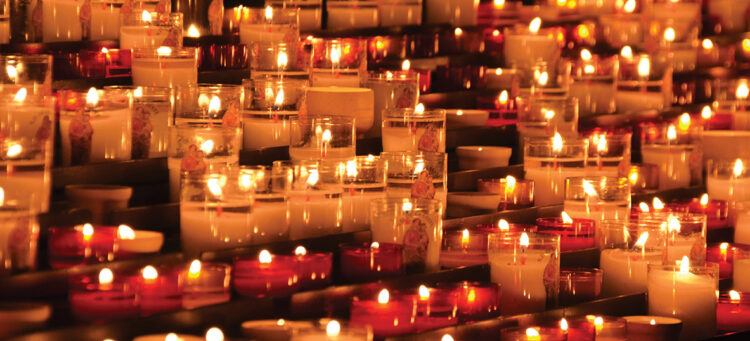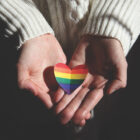
Conversations
Why faith is becoming less prominent in Canadian society
November, 2024
Pastor Darcy Albers estimates that he preaches before 100 worshipers split between two Sunday services at St. Albert Evangelical Lutheran Church. He also reaches an additional 80 viewers livestream on YouTube, a feature added during the pandemic. The numbers also get an upward bump during Christmas and Easter festivities, but it’s still a far cry from the 250 folks who regularly packed the pews every weekend a few decades ago.
He admits times have changed from the days when faith was far more dominant, an especially telling observation given St. Albert’s religious past. After all, the city started as a settlement more than 160 years ago, founded by Father Albert Lacombe, a Roman Catholic missionary.
“For a long time, the church was the centre of many people’s communities and so it was easy to go, but now it’s different,” said Pastor Darcy. “I feel that young people especially seem hesitant to commit to things. They kind of want to form their identities, both religious and otherwise, on their own terms. Even just growing up in the culture we are, it’s all subscription-based stuff. They’re hesitant to sign up or subscribe to things. People want to maintain that kind of individual or personal autonomy.”
Affiliation with religion
If younger people are still trying to define themselves, religion ̶ especially Christianity ̶ has become a smaller part of the equation. A 2021 Statistics Canada survey revealed that 59 percent of citizens born as early as the 1980s still maintained an affiliation with their faith. Granted, that still constitutes a majority, but the tally pales in comparison to those born as early as the 1940s, who have a more reverent connection at 87 percent.
Those differences in part explain why Canadians are gradually dissociating themselves from their faith. While 68 percent of Canadians overall say they are affiliated with a faith, still a sizeable majority, the number’s a significant drop from 90 percent, recorded in 1985. Conversely, the biggest proportionate increase was among those who didn’t have any religious affiliation whatsoever, pegged at 32 percent, double what was reported two decades earlier.
“The people that we have regularly coming to church are older, so we fit that pattern, and I know that it’s a widespread one between many churches”
said Pastor Darcy, who thinks the generational shift is one explanation for the downturn.
“I’m not convinced that’s the only piece. I do think that it’s a really multifaceted thing about this question of why are people kind of disengaging from Christianity. I know a lot of young people who still identify with the Christian faith and really cherish their Christian faith, but really don’t have much time for regular church attendance.”
Lower commitment
Younger people certainly have a lot more options than their predecessors, thanks to being raised in a democratic and economically stable country with a high standard of living, education and literacy. “Religious commitment is lower in places where life is easier,” noted the U.S.-based Pew Research Center in a 2018 study. “And in places where life is steadily becoming easier, the theory goes, younger adults generally are less religious than their parents’ and grandparents’ generations.”
The Catholic Archdiocese of Edmonton, which covers 97 parishes in the capital region ̶ including two in St. Albert ̶ didn’t disclose figures, but said its churches strive to ensure a place for young people.
“Anecdotally, we have noted there is a cross section of the population – older people who attend Mass because they have always done for decades, younger people who attend with family, as well as young adult,” said the Archdiocese in an email response. “There are groups within the Archdiocese specifically for young adults to deepen their faith – C-YEG (Catholic Young Adults of Edmonton) and young adults groups at St. Joseph’s College (University of Alberta) and MacEwan University.”
Cultural shift
Still, it’s not just younger Canadians avoiding places of worship. The numbers are far more widespread, given StatsCan’s findings that 53 percent of Canadians don’t attend church at all. The shift is more demographic than cultural, argued Ontario-based pastor and blogger Carey Nieuwhof. Other factors he cited include more affluent families and thus greater options, parents placing greater focus on kids’ sports, more online options, a move towards self-directed spirituality, and a failure to see a benefit in attending in the first place.
“Even among people who say they love the church and who say they love your church, if declining attendance is an issue, chances are it’s because they don’t see a direct benefit. They don’t see the value in being there week after week.”
Ontario-based pastor and blogger Carey Nieuwhof.
But several denominations row against the currents of faith’s downward flow. Some 90 percent of members in Christianity’s more evangelical congregations like Anabaptists, Mormons, Jehovah’s Witnesses, and Pentecostals reflect varying levels of importance religion has in their lives. So do between 70 to 90 percent of Hindus, Muslims, Jews, Sikhs. On the other hand, Catholics, Canada’s largest group of religious followers ̶ which comprise roughly one-third of the country’s population ̶ was pegged at 62 percent, below the national average.
Alberta faithful
Regionally, the prairie provinces have demonstrated the greatest resilience against the national drop. According to StatsCan, roughly 61 percent of folks in the region ages 18-35 said religion was important to them, as did 83 percent of respondents 55 and older. An Angus-Reid poll found that 72 percent of Albertans believed in God, the highest result next to Manitoba, at 76 percent. And EKOS Research Associates revealed that nearly 30 percent of Albertans attended church regularly, compared to 19 percent of Canadians overall.
In some respects, the survey results continue to be testament to Alberta’s fabled “Bible-belt” past, when religion interwove with politics, especially during the heydays of the right-wing Social Credit party that ruled the province for 36 years in the mid-20th century. Notably, two of its premiers were Baptist preachers.
But Pastor Darcy, who grew up on a farm in the province, believes that like politics, Albertans are so committed to their religion, they’re more likely to be vocal about it.
“One thing I’ve heard about Albertans is that we’re pretty opinionated, whether it’s conservative politics or progressive politics, we actually have strong opinions on both sides of the spectrum,” he said. “It might just be that when it comes to things like church and faith, we have strong opinions, too. We back up our convictions with action in that way.”
Immigrant influence
Devout Albertans might play a part in mitigating religion’s slide in Canada, but faith’s bigger source of support might come from abroad. Roughly 77 percent of immigrants in StatsCan’s poll reported they had a positive affiliation with their faith. “The greater tendency among immigrants to attend religious services is often attributed to the importance of religious communities as a place of social integration, especially in the first years after arriving in the country,” noted the study.
It’s a trend that the Catholic Archdiocese of Edmonton has applauded. “While we continue to build culture of vocations to the priesthood and religious life, three-quarters of our priests are foreign-born,” said the Archdiocese, noting that several Catholic parishes cater specifically to at least a dozen ethnic groups including Spanish, Polish and Chinese.
Also encouraging to the clergy is that despite the downward statistics, that spiritual belief is still prevalent in the country, which might be enough to bring in the multitudes for Christianity’s bigger gigs. “I’d rather have longer term church involvement throughout the year, but I’ll take them for Christmas and Easter, if that’s when they’re going to come,” said Pastor Darcy.













